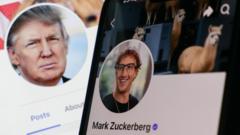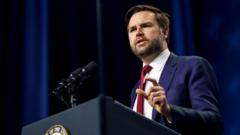Accusations arose after Donald Trump's inauguration, but Meta insists it follows established protocols during presidential transitions.
Meta Responds to Claims of Forced Follows for Trump Accounts

Meta Responds to Claims of Forced Follows for Trump Accounts
Meta clarifies that users were not compelled to follow Trump administration accounts on its platforms.
Meta, the parent company of Facebook and Instagram, has publicly refuted claims that users were forced to follow the official accounts for the new Trump administration, including those of President Donald Trump, Vice-President JD Vance, and First Lady Melania Trump. Complaints from users surfaced following Trump's inauguration on Monday, with many expressing frustration at being "automatically" subscribed to these high-profile accounts.
Meta spokesperson Andy Stone addressed these concerns, clarifying that the accounts were updated at the discretion of the White House, following the same guidelines as previous presidential transitions. He emphasized that the handles — Potus for the president, VicePresident for the vice president, and Flotus for the First Lady — had merely shifted to reflect the new officeholders' information.
Archived accounts indicated that the previous occupants, Joe Biden and Jill Biden, were linked to the same handles. Stone explained that changes during such transitions might lead to delays in processing follow and unfollow requests as the management of the accounts changes.
On the political front, Trump wasted no time in enacting executive orders, including moves to withdraw from the WHO and declare a national emergency at the southern border, following his second inauguration. Notably, the event saw attendance from numerous influential tech figures, including Meta’s Mark Zuckerberg and X’s CEO Elon Musk, both of whom have cultivated more favorable relations with Trump recently.
Despite a previous ban imposed on Trump by Meta in 2021, due to "praise for people engaged in violence" during the January 6 Capitol riots, recent interactions suggest a shift. In a contradictory turn of events, Zuckerberg has since expressed regrets regarding the decision to suspend Trump’s account and even contributed $1 million towards his inauguration.
Earlier this month, Meta revealed its intention to discontinue third-party fact-checking, adopting a strategy akin to X's community notes, ostensibly to ameliorate concerns previously raised by Trump. The company framed this move as a reaffirmation of its commitment to free expression. Who would have imagined that, amidst a controversial election cycle, social media giants would navigate such a complex landscape of political influence and user autonomy?





















